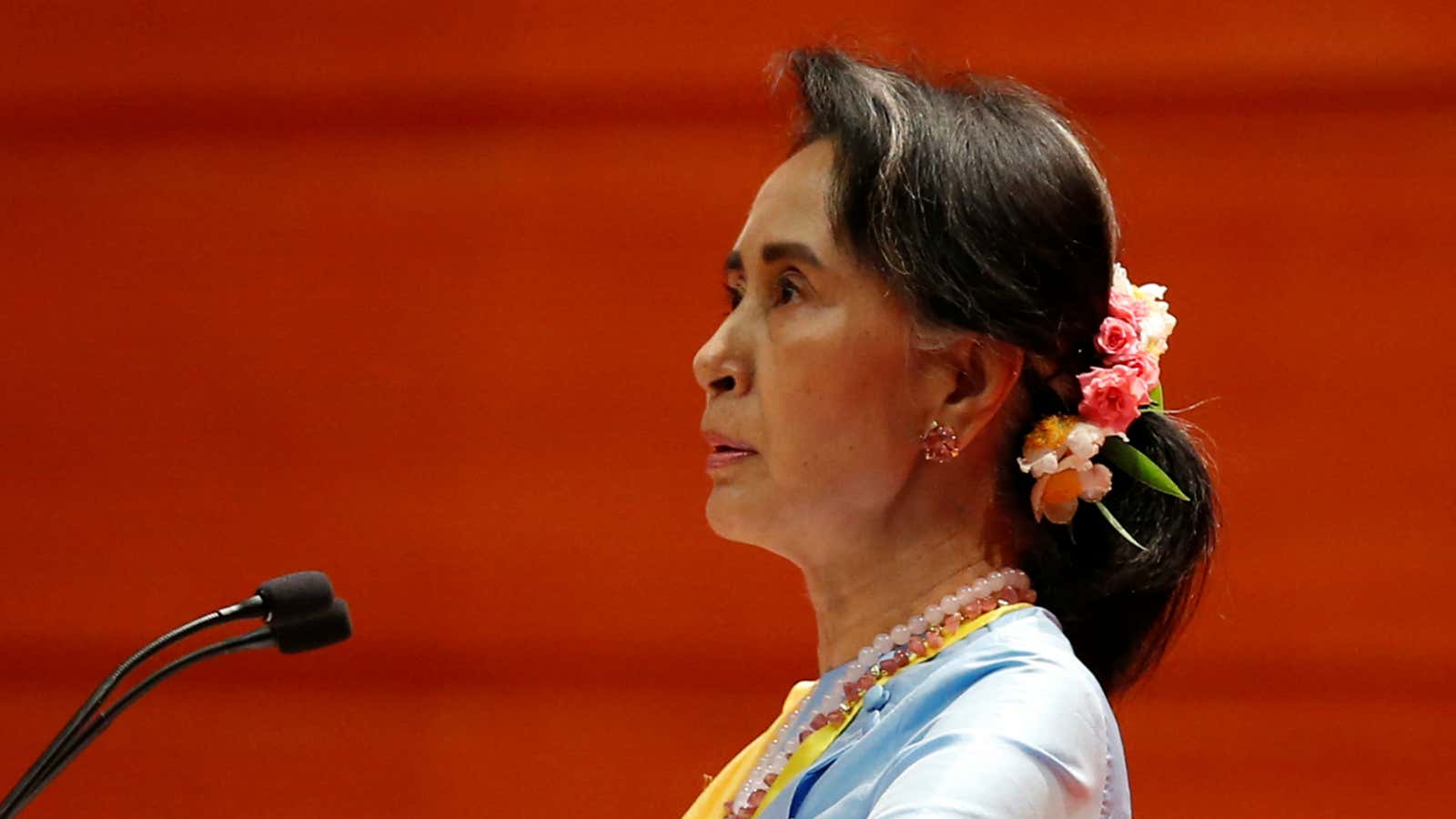It’s not easy to defend Aung San Suu Kyi’s actions, or the lack of it, as the crisis in Myanmar’s northwestern Rakhine region spirals out of control. Hundreds have been killed, hundreds of thousands of Rohingya, a long-persecuted Muslim minority numbering around a million, have fled to neighboring Bangladesh, while their villages still smolder.
Yet to ignore the constraints of the political matrix within which Suu Kyi is operating would be a mistake.
Two years ago she and her party, the National League for Democracy, swept into power in the country’s first truly democratic elections in a quarter of a century—but with a few caveats.
Myanmar’s powerful military, the Tatmadaw, would continue to hold a quarter of all seats in parliament, with the generals retaining control of key ministries including home affairs, defense and borders. Also Suu Kyi couldn’t become president because both her sons hold foreign passports, a violation of the constitutional norm that require the head of state, their spouse and children to be Myanmar citizens. Instead, Suu Kyi created a new position, Myanmar’s state counsellor, and signed up for a giant balancing act, one in which she’d have to satisfy an impatient electorate while keeping the generals appeased.
This arrangement has turned the ongoing Rohingya crisis into a tightrope walk.
Public opinion among Myanmar’s Buddhist-majority population has been stacked against the Muslim minority in Rakhine since 2012, when violence between the groups left at least 200 dead. For decades, successive governments in Myanmar have even refused to accept the Rohingya as an indigenous ethnic group, denying them citizenship. And since the recent round of violence that started in August, reports of attacks by Muslim insurgent groups on civilians, including Hindus, have sharply increased the animosity against the Rohingya. “The narrative is that Muslims are migrants. They are basically the guests of this country, yet they insult their host,” an official involved with Myanmar’s peace process told Quartz, requesting anonymity.
Hemmed in by public sentiment at one end, Suu Kyi has also had to deal with an increasingly restive military. The Tatmadaw isn’t used to being reined in by a civilian government, particularly not when its troops are under fire, as they have been Rakhine. The military has also been under close scrutiny after allegations of human-rights abuses during the four-month-long offensive in the region that began last year. Their apparent target was the Arakan Rohingya Salvation Army (ARSA), a terror group with purported foreign backing that attacked security outposts in October. ”The military considers this a sovereignty issue,” the official explained. “Especially when the police and army are under attack, they want to go all out.”
By most accounts, the military has hit back hard after a major attack by the ARSA last month. Since Aug. 25, Myanmar’s security forces have killed at least 370 people, allegedly rampaged through and pillaged entire villages, and triggered an exodus of some 270,000 Rohingya. Suu Kyi’s government, meanwhile, has blocked humanitarian assistance into Rakhine, stalled independent investigations and even accused aid workers of helping terrorists.
Still, some observers insist that Suu Kyi has tried to hold back the Tatmadaw.
“It is clear that the military want to drive out Muslim people from these areas but Daw Suu’s government has not allowed it to do so,” Sithu Aung Myint, a prominent political commentator based in Yangon, told Quartz. (Daw is an honorific).
The military also has the backing of the Arakan National Party (ANP), a nationalist, anti-Rohingya organization that has the most seats in the Rakhine State parliament. “ANP has same idea as the military,” Sithu Aung Myint said. “They also want to drive out Muslim people, and they accuse that all Muslims are migrants from Bangladesh.” Despite all her failings, according to this version of events, Suu Kyi may be all that stands between the Rohingya and an all-out genocide.
Last August, Suu Kyi also put together an advisory commission, chaired by former UN secretary general Kofi Annan, to find “a sustainable solution on the complicated issues in Rakhine State.” In a final report submitted last month, just as the violence erupted in Rakhine, the commission drew up a long list of recommendations (pdf), including a streamlined citizenship verification process for the region.
“Aung San Suu Kyi will definitely implement (the citizenship recommendation) under the Annan commission,” said Sithu Aung Myint, “but it will be difficult for her because the military does not want it.”
If Suu Kyi does speak out against the violence or speak up for Rohingya—as many have exhorted her to—she not only risks the resentment of large section of the Myanmar electorate (including the Buddhist clergy), but also that of the hardline military. And if she loses both popular support and the Tatmadaw’s backing, it’ll be hard for her to govern effectively or, conceivably, remain in power.
Meanwhile, the international community demands that she take the higher moral ground and unequivocally condemn events unfolding in the Rakhine region. ”She is in a very difficult position,” the official added, “because she can’t win on either side.”
We welcome your comments at [email protected].
